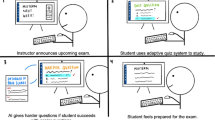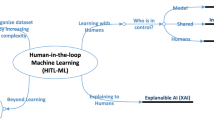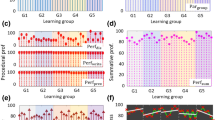Abstract
Purpose
Considerable attention has been paid to content adaptation in ITS. However, process-oriented adaptation has been neglected and none of ITS addressed the correlation between the learning and the teaching process. Indeed, uncertainty coming from the dynamic preferences of learners and tutors, the evolutionary cognitive state of the learner and the choice of goals and educational strategies is not well considered in ITS. So, in this paper, a new proposal for guiding and adapting the construction of both learning and pedagogical processes named educational processes in intelligent tutoring system is described and detailed.
Method
The research strategy followed is based on a dynamic Bayesian network to predict the educational context, a strategic perspective for modeling educational processes, and guidance algorithms for their development and support. This aims to generate an individualized learning process for each learner by selecting the most appropriate pedagogical process according to the actual preferences of the tutor.
Results
Experimental results are given to illustrate the applicability of the proposed solution. The results show an improvement in guiding the learner and the teacher/tutor by considering the evolving and uncertain educational context.
Conclusion
Learners will be therefore able to achieve the learning goal more efficiently when the pedagogical process is more adapted to their individual differences. The evaluation of knowledge improvement, the appropriateness of educational recommended context and the prediction effectiveness shows promising results.



















Similar content being viewed by others
Notes
ICPT of a node \( X_i \) is a table of posterior probabilities \( P(X_{i}|PA(X_{i}),E) \) conditional on the evidence and indexed by its immediate predecessors, \(PA(X_i).\)
References
Arroyo, I., Woolf, B.P.: Inferring learning and attitudes from a Bayesian network of log file data. In: AIED, (2005) pp 33–40
Baker, C., Saxe, R., Tenenbaum, J.B.: Bayesian models of human action understanding. In: Advances in neural information processing systems, pp 99–106 (2006)
Baschera, G.M., Busetto, A.G., Klingler, S., Buhmann, J.M., Gross, M.: Modeling engagement dynamics in spelling learning. In: International Conference on Artificial Intelligence in Education, Springer, pp 31–38 (2011)
Bayounes, W., Saâdi, I.B., BenGhézala, H.: Towards a framework definition for learning process engineering supported by an adaptive learning system. In: Proceeding of International IEEE Conference on Technology Enhanced Education, pp. 366–373. Amritapuri, India (2012)
Bayounes, W., Saâdi, I.B., Kinshuk, Ghézala, H.B.: An intentional model for learning process guidance in adaptive learning system. In: Proc. 22nd IBIMA Conference, pp. 1476–1490 (2013)
Bayounes, W., Saâdi, I.B., Kinshuk, BenGhézala, H.: An intentional model for pedagogical process guidance supported by an adaptive learning system. In: Proc. 23rd IBIMA Conference, pp. 1211–1227 (2014)
Cha, H.J., Kim, Y.S., Park, S.H., Yoon, T.B., Jung, Y.M., Lee, J.H.: Learning styles diagnosis based on user interface behaviors for the customization of learning interfaces in an intelligent tutoring system. Lecture Notes in Computer Science (including subseries Lecture Notes in Artificial Intelligence and Lecture Notes in Bioinformatics) 4053 LNCS, 513–524 (2006). https://doi.org/10.1007/11774303_51
Chynał, P., Kozierkiewicz-Hetmańska, A., Pietranik, M.: Personalisation of learning process in intelligent tutoring systems using behavioural measures. In: Multimedia and Network Information Systems, Springer, pp. 407–417 (2017)
Clark, D.: Honey and Mumford’s learning styles questionnaire. Retrieved 2 Aug 2010 (2008)
Codetta-Raiteri, D., Bobbio, A., Montani, S., Portinale, L.: A dynamic Bayesian network based framework to evaluate cascading effects in a power grid. Eng. Appl. ArtifIntell. 25(4), 683–697 (2012)
Conati, C., Gertner, A., Vanlehn, K.: Using Bayesian networks to manage uncertainty in student modeling. User Model. User-Adap. Int. 12(4), 371–417 (2002)
Fayombo, G.: Learning styles, teaching strategies and academic achievement among some psychology undergraduates in Barbados. Caribbean Educ. Res. J. 3(2), 46–61 (2015)
Frank, M.C., Tenenbaum, J.B.: Three ideal observer models for rule learning in simple languages. Cognition 120(3), 360–371 (2011)
García, P., Amandi, A., Schiaffino, S., Campo, M.: Evaluating Bayesian networks’ precision for detecting students’ learning styles. Comput. Educ. 49(3), 794–808 (2007). https://doi.org/10.1016/j.compedu.2005.11.017
Ghanmi, N., Mohamed Ali Mahjoub, N.E., Amara, B.: Characterization of dynamic Bayesian network the dynamic Bayesian network as temporal network. Int. J. Adv. Comput. Sci. Appl. 2(7), 53–60 (2011)
González-Brenes, J., Huang, Y., Brusilovsky, P.: General features in knowledge tracing to model multiple subskills, temporal item response theory, and expert knowledge. In: The 7th International Conference on Educational Data Mining, University of Pittsburgh, pp. 84–91 (2014)
Hatzilygeroudis, I., Prentzas, J.: Using a hybrid rule-based approach in developing an intelligent tutoring system with knowledge acquisition and update capabilities. Expert Syst. Appl. 26(4), 477–492 (2004)
Hawkins, W.J., Heffernan, N.T., Baker, R.S.: Learning Bayesian knowledge tracing parameters with a knowledge heuristic and empirical probabilities. In: International Conference on Intelligent Tutoring Systems, Springer, pp. 150–155 (2014)
Jarušek, P., Pelánek, R.: Analysis of a simple model of problem solving times. In: International Conference on Intelligent Tutoring Systems, Springer, pp. 379–388 (2012)
Käser, T., Baschera, G.M., Busetto, A.G., Klingler, S., Solenthaler, B., Buhmann, J.M., Gross, M.: Towards a framework for modelling engagement dynamics in multiple learning domains. Int. J. Artif. Intell. Educ. 22(1–2), 59–83 (2013)
Käser, T., Klingler, S., Schwing, A.G., Gross, M.: Dynamic Bayesian networks for student modeling. IEEE Trans. Learn. Technol. 10(4), 450–462 (2017)
Latham, A., Crockett, K., McLean, D., Edmonds, B.: Adaptive tutoring in an intelligent conversational agent system. In: Transactions on Computational Collective Intelligence VIII, Springer, pp. 148–167 (2012)
Lin, C., Chi, M.: Intervention-bkt: Incorporating instructional interventions into Bayesian knowledge tracing. In: International Conference on Intelligent Tutoring Systems, Springer, pp. 208–218 (2016)
Mayo, M., Mitrovic, A.: Optimising its behaviour with Bayesian networks and decision theory. Int. J. Artif. Intell. Educ. 12, 124–153 (2001)
Mihajlovic, V., Petkovic, M.: Dynamic Bayesian networks: a state of the art (2001)
Muñoz-Merino, P.J., Molina, M.F., Muñoz-Organero, M., Kloos, C.D.: An adaptive and innovative question-driven competition-based intelligent tutoring system for learning. Expert Syst. Appl. 39(8), 6932–6948 (2012)
Pardos, Z.A., Heffernan, N.T.: Modeling individualization in a Bayesian networks implementation of knowledge tracing. In: International Conference on User Modeling, Adaptation, and Personalization, Springer, pp. 255–266 (2010)
Pardos, Z.A., Dailey, M.D., Heffernan, N.T.: Learning what works in its from non-traditional randomized controlled trial data. Int. J. Artif. Intell. Educ. 21(1–2), 47–63 (2011)
Parvez, S.M., Blank, G.D.: Individualizing tutoring with learning style based feedback. In: International Conference on Intelligent Tutoring Systems, Springer, pp. 291–301 (2008)
Pelánek, R.: Bayesian knowledge tracing, logistic models, and beyond: an overview of learner modeling techniques. User Model. User-Adap. Int. 27(3–5), 313–350 (2017)
Rau, M., Aleven, V., Rummel, N., Pardos, Z.: How should intelligent tutoring systems sequence multiple graphical representations of fractions? A multi-methods study. Int. J. Artif. Intell. Educ. 24(2), 125–161 (2014)
Reye, J.: Student modelling based on belief networks. Int. J. Artif. Intell. Educ. 14(1), 63–96 (2004)
Rolland, C.: Capturing system intentionality with maps. In: Conceptual Modelling in Information Systems Engineering, Springer, pp. 141–158 (2007)
Rolland, C., Salinesi, C.: Modeling goals and reasoning with them. In: Engineering and Managing Software Requirements, Springer, pp. 189–217 (2005)
Rolland, C., Prakash, N., Benjamen, A.: A multi-model view of process modelling. Requir. Eng. 4(4), 169–187 (1999)
Rumelhart, D.E., Norman, D.A.: Accretion, tuning and restructuring: three modes of learning. Report no. 7602 (1976)
Schiaffino, S., Garcia, P., Amandi, A.: eteacher: Providing personalized assistance to e-learning students. Comput. Educ. 51(4), 1744–1754 (2008)
Schultz, S., Arroyo, I.: Tracing knowledge and engagement in parallel in an intelligent tutoring system. In: Educational Data Mining 2014 (2014)
Stamper, J., Barnes, T., Lehmann, L., Croy, M.: The hint factory: automatic generation of contextualized help for existing computer aided instruction. In: Proceedings of the 9th International Conference on Intelligent Tutoring Systems Young Researchers Track, pp. 71–78 (2008)
Van De Sande, B.: Properties of the Bayesian knowledge tracing model. JEDM—J. Educ. Data Min. 5(2), 1–10 (2013)
Vicari, R., Flores, C.D., Seixas, L., Gluz, J.C., Coelho, H.: Amplia: a probabilistic learning environment. Int. J. Artif. Intell. Educ. 18(4), 347–373 (2008)
Wang, D., Han, H., Zhan, Z., Xu, J., Liu, Q., Ren, G.: A problem solving oriented intelligent tutoring system to improve students’ acquisition of basic computer skills. Comput. Educ. 81, 102–112 (2015). https://doi.org/10.1016/j.compedu.2014.10.003
Wang, S.L., Wu, P.Y.: The role of feedback and self-efficacy on web-based learning: the social cognitive perspective. Comput. Educ. 51(4), 1589–1598 (2008)
Yuan, C., Druzdzel, M.J.: Importance sampling algorithms for Bayesian networks: principles and performance. Math. Comput. Model. 43(9), 1189–1207 (2006)
Acknowledgements
The authors acknowledge the support of the Tunisian CDUP (Center of Didactic and University Pedagogy), and students and tutors who participated in the experimentation phase. All experimental data have been obtained using SMILE, a Bayesian inference engine developed at the Decision Systems Laboratory, University of Pittsburgh, and available at http://genie.sis.pitt.edu.
Author information
Authors and Affiliations
Corresponding author
Ethics declarations
Ethical standards
All procedures performed in studies involving human participants were in accordance with the ethical standards of the institutional and/or national research committee and with the 1964 Declaration of Helsinki and its later amendments or comparable ethical standards.
Informed consent
Informed consent was obtained from all individual participants included in the study.
Additional information
Publisher's Note
Springer Nature remains neutral with regard to jurisdictional claims in published maps and institutional affiliations.
Rights and permissions
About this article
Cite this article
Saâdi, I.B., Bayounes, W. & Ben Ghezala, H. Educational processes’ guidance based on evolving context prediction in intelligent tutoring systems. Univ Access Inf Soc 19, 701–724 (2020). https://doi.org/10.1007/s10209-019-00667-w
Published:
Issue Date:
DOI: https://doi.org/10.1007/s10209-019-00667-w




